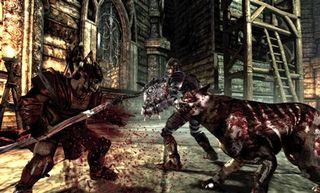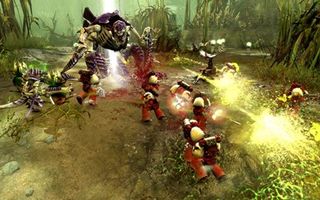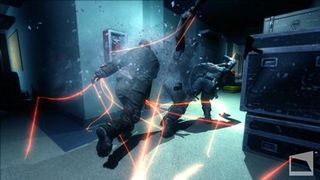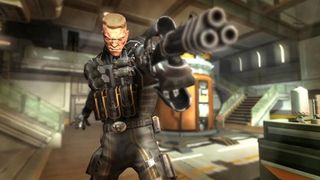The top 9 PC games of 09
The best on your desktop in the coming year
Dragon Age: Origins
Something old, something new in the spiritual sequel to Baldur’s Gate
Dialog trees, party-based pausable combat, choose-your-own morality branching narratives - in its 13-year history, BioWare has been refining core RPG elements with each franchise it’s produced, grinding away impurities to deliver polished, personal role-playing. We’re particularly stoked about Dragon Age's emphasis on your character’s origin story - before you get your gauntlets on the main quest, a three-hour section establishes your character’s history with a few formative decisions. Your selected race and class determines your starting point within the campaign, and party recruits will hinge on whether you’ve aligned yourself as a hero, martyr, or tyrant.

Fans of Neverwinter Nights should pay heed: Dragon Age will include atoolset for creating campaigns that you’ll be able to share publicly with other users. But it’s spell combos and the promising AI tooling (such as “programming” party members to auto-heal you if your health drops below 30 percent) that bring a modern touch to the classic pausable combat and promise to make Dragon Age: Origins another high point in BioWare’s campaign to elevate the RPG.
Warhammer 40K: Dawn of War II
Real-time strategy that’s as beautiful as it is bloody

Warhammer 40,000: Dawn of War II is an effort to push the real-time strategy genre forward on almost every level. First, it transfers DoW’s ridiculously brutal and bloody combat to Relic’s astonishing Essence engine (the same one that powers Company of Heroes), allowing for insane detail, destructible terrain, and an emphasis on cover-based combat that makes using the environment to your advantage crucial to success. It also shifts focus away from base building and toward managing a smaller number of units, adds “War Gear” loot drops to the mix that can be picked up or earned during battles and equipped to specialize each of your squad leaders, and a dynamic campaign system that allows you to choose when and where to fight. And, of course, Relic has finally added the fan-favorite and fearsome Tyrannids to the mix, making the inevitable bloodbath that much more intense. With Relic’s proven RTS design abilities and top-tier technology, there isn’t a question of whether DoWII will be a great game - it’s just a matter of how great.
FEAR 2: Project Origin
The return of gaming’s creepiest acronym

The follow-up to our favorite punctuation-heavy shooter (sorry, STALKER) will deliver more variety - less of the identical cubicles and warehouse spaces you battled through in the first game, FEAR 2: Project Origin reveals more of the city that Armacham’s Alma experiment (the titular Project Origin) reduced to ruins. Already, we’ve seen settings creepier than Steve Buscemi reading a romance novel to schoolchildren, like a hospital, abandoned school and nuclear facility. These areas are a more fitting playground for our favorite underage terror, who Monolith says will be a more tangible presence. If the sequel can successfully replicate the brilliant, dynamic AI that powered the clone soldiers we shot up in slow-mo in FEAR, and inject a steady stream of even more disorienting haunts from Alma, we’ll be satisfied, but other additions, like suiting up in a bipedal mech to spit some scares back at your enemies, have us anticipating FEAR 2 as a shooter that brings a perfect balance of horror atmosphere and great gunplay.
Sign up to the GamesRadar+ Newsletter
Weekly digests, tales from the communities you love, and more
The Sims 3
It’s not such a small world, after all

Going from playing The Sims 2 to The Sims 3 will be a revelation for the millions of fans of the living dollhouse series. While the visual upgrade appears to be relatively small (Sims do look significantly better, but due to the cartoony style, the improvements don’t jump out at you), the real difference is that your Sims will no longer be contained in their homes - they’ll be able to roam freely around the surrounding town, travelling from home to work to the park to the store, all without pausing for one of The Sims 2’s interminable loading screens. The entire neighborhood is in motion, with dozens of Sims going about their business, socializing, and even raising families on their own, but to make any real progress in their lives and realize their dreams and goals, they’ll need your help.
Deus Ex 3
A new beginning for a classic game

Following an act like the magnificent Deus Ex is a difficult task - as proven by 2003’s poorly received sequel, Deus Ex: Invisible War. Eidos Montreal’s plans for this second attempt to do justice to the DX name are bold and ambitious; call us suckers, but we’re looking forward to it.
Deus Ex 3 will be a prequel, set in the world that will eventually crumble into factions for and against the augmentations that made DX so memorable. Deus Ex 3 explores the beginnings of human augmentation, where the additions are prosthetics that will enhance both the physical abilities and the appearance of the user, and the world has to come to terms with people being better, stronger, and faster. As a security guard at a bio-mechanical augmentations lab overrun by special ops, you’ll play a key role in how these events unfold.
The original’s role-playing elements are still there, but the game will also recognize a player's gaming skills, so that skilled first-person shooter players, for example, will not be frustrated by their character’s inability to hit the broad side of a barn. And this time, stealth is dependent on physical cover, so you’ll need use the environment to mask your movements rather than just your stats. Controversial? Anything to do with a game as beloved as Deus Ex always is, and especially after the IW debacle, fans are a bit nervous. But there’s a new Deus Ex game coming out, and that’s a name that gives us augmented tingles.
Empire: Total War
Conquering the world, now by land and sea

With Empire: Total War, Creative Assembly is delivering not just the most advanced Total War game ever, but expanding it in scope by 50 percent with the new naval warfare mode joining the turn-based empire-building and the land-based real-time strategy modes.
The mighty ships of the 18th century are a very different experience from what we’re used to; it’s far more about positioning, timing and teamwork. In a multiplayer battle (which is now managed through Steam’s matching service) we played as the Dutch allied with the Spanish against a British and French fleet, and discovered it was far more effective to coordinate an attack on a single enemy ship and batter it with the full range of cannons, rather than take the full brunt of the enemy armada at once. Wind, too, plays its part; real-world sailing experience will pay off when tacking into a headwind.
It’s a very complex and tactical experience, and this is just one third of the total, enormous game. The wait won’t be much longer, though - Empire is so close, we can taste the cordite. Look for the review very, very soon.
Jan 20, 2009

Oh, that's why the Stellar Blade devs were terrified by demo players: one fan's spent "about 60 hours" maxing Eve's skill tree before the action RPG is even out

A new Taylor Swift song mentions GTA, but some remember it mentioning Baldur's Gate 3, Final Fantasy 14, and more in hilarious Twitter trend
Most Popular




